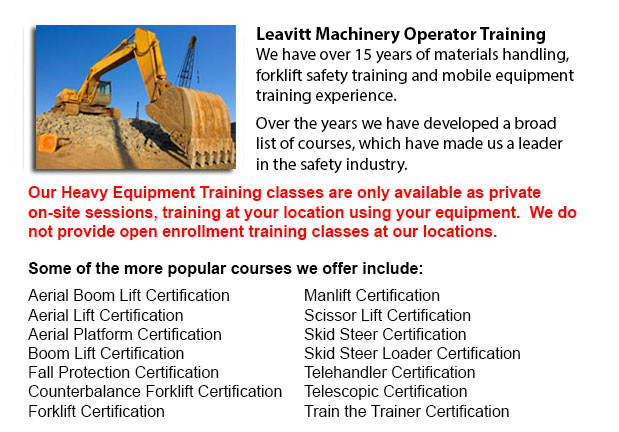
Heavy Equipment Training Courses Alberta - When selecting a heavy equipment operator course, the first step must be to determine the capacity in which you would be working with heavy machinery. You can find the correct course to teach you how to operate the equipment or to fix these machinery. Numerous options are out there, be certain to align your career objectives and your research so you can figure out what classes will be best for you. It is essential to select classes that are recognized and approved by the local governing bodies within your region.
There are plenty of certification kinds around. Some training is specific to the particular kind of heavy equipment you would like to operate. Like for example, crane operator certification will require different heavy equipment classes than those found in forklift certification. Crane certification will enable you to safely operate a crane, while the latter will allow you to handle various types of materials handling machinery. It is a great idea to check with your present employer before enrolling in whichever classes in order to ensure the ones you pick will fulfill the training needs your employer has planned for you.
Heavy Equipment Operator Training
HEO or likewise known as the heavy equipment operator courses would provide you with the knowledge and skills required to be able to enter the workforce as an entry level heavy machine operator. In this twelve week course together with a practicum, you would focus on jobsite basics including: health, environmental and safety awareness and training, machine maintenance and operation, and use of earth moving techniques in hands-on conditions.
Operator training will help those work with their selected heavy machinery like for instance a compactor, grader, loader, an excavator and a dozer. The essential skills which an operator would need to work with heavy machinery includes: excellent oral communication skills, excellent problem solving skills, physical stamina and strength, excellent spatial ability and excellent vision, the ability to work alone or well with others in a team and excellent manual dexterity along with good eye-hand coordination.
Technical skills are also necessary to operate these machinery. These skills comprise: general mechanical ability, being able to operate equipment and power tools, knowledge of safe working procedures, the ability to follow grade plans, technical specifications and read directions, the ability to make basic measurements and mathematical calculations, and the ability to carry out basic mechanical repairs and maintenance.
-
Crane Training School Alberta
Crane Training School Alberta - The crane training school provides industry-relevant programs. Courses provide trainees with learning results which match current industry demands. Our small class sizes combine theory and hand-on experience. Our quali... More -
Aerial Lift / Boom Lift / Man Lift / Scissor Lift Training in Alberta
Scissor platform lifts are lift truck tables which lift up materials and people and supplies vertically. They are normally utilized in commercial, industrial and construction environments. A common use of scissor lifts is for lowering or lifting cons... More -
Forklift Certification Courses Alberta
Forklift Certification Courses Alberta - Forklift certification really helps to be able to ensure that businesses are following regulations and legislation. Forklift operators must go through certification prior to being permitted to run machinery. I... More -
Manlift Ticket Alberta
Manlift Ticket Alberta - The Elevated Platforms and Manlifts Certification program helps to provide the required training on the safe operating procedures, work practice, rules and regulations regarding the daily activities for the operators of this... More -
Crane Safety Training Alberta
Crane Safety Training Alberta - Both crane driver and their supervisors have to be aware of all the possible problems associated to the operation of an overhead crane. All over North America, there is legislation which provides rules for the safe ins... More -
Fall Protection Training in Alberta
There are high numbers of injuries at work connected to falling and a lot of fall-related deaths reported each year. Most of these instances might have been avoided with better training, better measures in place, and by correctly equipping staff befo... More -
Scissor Lift Ticket Alberta
Scissor Lift Ticket Alberta - Scissor hoists have significantly benefited construction operations in view of the fact that the work that used to need a lot of effort and lots of people, could now be done using the scissor lift and just one individual... More -
Overhead Crane Training Alberta
Overhead Crane Training Alberta - An overhead crane is a huge crane utilized to move and lift large, heavy things that can't be lifted by hand. An overhead crane is typically fixed in place when in use. These machinery are capable of moving huge volu... More

Forklift Training Alberta
TOLL FREE: 1-888-254-6157
forkliftcertificationalberta.com/
Email Us
About Us


